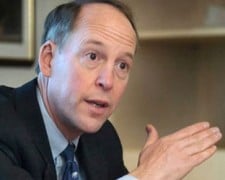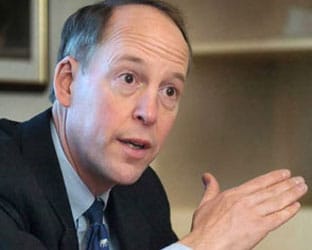 At a House Communications Subcommittee, FCC Chairman Tom Wheeler argued against special rules for his agency. Subcommittee Chairman Greg Walden (R-OR) respectfully disagreed.
At a House Communications Subcommittee, FCC Chairman Tom Wheeler argued against special rules for his agency. Subcommittee Chairman Greg Walden (R-OR) respectfully disagreed.
Walden said that the FCC cannot be run like “some venture capital firm.”
Here are Walden’s full remarks:
Good afternoon and welcome to the Subcommittee on Communications and Technology’s legislative hearing on three draft bills to improve transparency at the FCC.
Our subcommittee, often on a bipartisan basis, has worked to make the FCC a more transparent and accountable public body for many years and under various FCC chairmen. These bills, sponsored by my colleagues, continue those well-meaning efforts to make even powerful bureaucrats realize this is the public’s business that’s being conducted. The FCC is not some venture capital firm; the FCC is an independent agency that reports to Congress.
Commissioner O’Rielly, thank you for your well-reasoned and helpful testimony. I appreciate your insights, tone and suggestions. You seem to understand the proper role of the FCC and welcome the opportunity to improve how it functions so that it can better serve the public. I commend you for your views and your willingness to work with this committee. You have pointed out material problems at the FCC and offered constructive solutions. Thank you.
I wish I could say the same for your testimony Chairman Wheeler. If you really think that drafting, amending and adopting rules without giving the public an opportunity to see them before they are crammed down their throats is good process, then it’s no wonder the public has little faith in the agencies of government.
Under the current power structure at the FCC the Chairman has incredible authority—that none of the other commissioners has— because the Chairman alone controls access to FCC information, he or she can call in their own “validators” to get the inside track and become a well tuned chorus of support for their pet policies. “Friends of the Chairman” get special perks to weigh in and access information that the rest of the public doesn’t get to see, and that other commissioners can’t even discuss. Commissioner O’Rielly exposes this charade for what it is in his testimony. None of us on this committee would tolerate the insult to our First Amendment rights that the commissioners at the FCC must suffer at the hands of the Chairman.
Chairman Wheeler urges us to not make the FCC subject to its own special set of rules. This is a refrain I’ve heard from some of my colleagues who want to expand the Commission’s private discussions – a special rule that would only apply to the FCC – but oppose making the Commission’s actions more public. If the Chairman would like to subject the FCC to the same rules as the other agencies of the Federal government, we can certainly make that happen.
Of course, that would mean the Chairman could no longer hand pick the agency’s inspector general or have the IG report to the Chairman. We’d have real independence in the IG’s office. And under the rules that other agencies follow we wouldn’t have this silly argument over producing cost-benefit analyses for rulemakings. The FCC would simply have to follow the law and produce them. Trying to hide behind the skirt of the APA and pretend that the FCC is just another Federal agency insults this committee.
And I cannot help but respond to the nonsense that my colleagues’ legislation would somehow unduly burden the FCC by requiring it to link a document that already exists to its website. Such a requirement wasn’t considered a burden when the FCC forced broadcasters to scan their political files and make them available on the Internet. But now we’re supposed to believe that a similar requirement for an agency with 1,700 employees is a too much of a burden? Really?
The FCC loves to come up to Capitol Hill and tell us how they are special because they have a “public interest” mandate. That mandate is a double-edged sword, which means you are stuck with both the rights and the attendant obligations. I can’t for the life of me come up with a legitimate rationale for how it is in the public interest to operate in secret, specifically excluding the public from the rules you are considering.
My colleagues who wrote these measures and I are on the side of reforming the Washington bureaucracy. It is disappointing to see that you don’t share our commitment to better government, Chairman Wheeler. We believe the public deserves more access to the process. We believe the public is best served by an open, transparent and accountable government. And we will not stop in our cause and quest, even if that means taking on the entrenched and powerful. We have only just begun.





